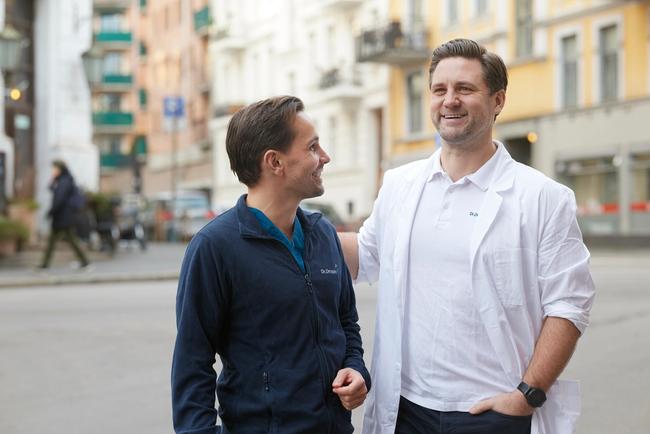
Why choose Medical Weightloss?
Medical treatment of obesity with scientifically documented medications, guidance and follow-up.


✔️ Comprehensive assessment of disease and weight history
✔️ Measurement of weight, height, waist measurement and blood pressure
✔️ Blood tests to detect health risks
✔️ Written report and information about medicines
✔️ Possibly digital prescription

✔️ Initiation/follow-up of your weight loss plan
✔️ Initiation of medical treatment if granted
✔️ Follow-up of side effects
✔️ Dose adjustment
✔️ Personal guidance from your doctor

Assessing the state of health and taking samples to determine whether it is safe for you to use weight-reducing medicine.

You will receive a message in Pasientsky within 5 days about whether you have qualified to start the medication or other treatment

Ongoing monitoring of your weight loss journey, including assistance with managing side effects and providing guidance on nutrition. The frequency will be determined collaboratively between you and your physician.

Why choose Medical Weightloss?
Our objective is to support individuals in reducing the risk of lifestyle diseases associated with excess weight and obesity, while simultaneously promoting improved physical and mental well-being. Through personalized weight counseling, combined with the utilization of safe and scientifically validated medications, our aim is to help you achieve long-term weight loss instead of pursuing rapid, short-term solutions.
The solution is not always as simple as eating less and moving more.
We at Dr.Dropin are committed to taking an interdisciplinary approach to weight loss.
Our physiotherapists and personal trainers can assist you with treatment, follow-up, and guidance for taking care of your body, regardless of your starting point. You can also receive individually tailored treatment and training programs with us.
If you need someone to talk to about big or small issues, you can speak with our psychologists. We have psychologists with experience in areas such as overeating, lifestyle changes, stress, self-esteem, life challenges, and more
If you are already taking weight medicine, but want to have quality-assured treatment and/or receive further follow-up from us, you can still start a course with Dr. Dropin.
Book an assessment session in the booking process.
If you are already taking weight medicine, but want to have quality-assured treatment and/or receive further follow-up from us, you can still start a course with Dr. Dropin.
Book an assessment session in the booking process.
It is not a requirement to make preparations, but it may be a good idea to have thought through the following: your health and weight history. What do you wish to achieve with this program? Do you have any regular medications or known illnesses that the physician should be aware of?
It is not a requirement to make preparations, but it may be a good idea to have thought through the following: your health and weight history. What do you wish to achieve with this program? Do you have any regular medications or known illnesses that the physician should be aware of?
At Dr.Dropin, we understand that lifestyles and preferences vary. Therefore, we offer two flexible options for our medical weight loss program:
Physical Consultations at the Clinic:
For those who prefer personalized follow-up and thorough examinations, we offer consultations at our clinics in Oslo, Sandvika, Lillestrøm, Trondheim, Stavanger, and Bergen.
Digital Video Consultations:
For maximum flexibility, you can participate in the program from anywhere in Norway via video consultation. This option allows you to meet with your doctor from home or on the go.
Follow-up Tailored to Your Needs:
Regardless of which option you choose, follow-up can take place via video or in the clinic.
At Dr.Dropin, we understand that lifestyles and preferences vary. Therefore, we offer two flexible options for our medical weight loss program:
Physical Consultations at the Clinic:
For those who prefer personalized follow-up and thorough examinations, we offer consultations at our clinics in Oslo, Sandvika, Lillestrøm, Trondheim, Stavanger, and Bergen.
Digital Video Consultations:
For maximum flexibility, you can participate in the program from anywhere in Norway via video consultation. This option allows you to meet with your doctor from home or on the go.
Follow-up Tailored to Your Needs:
Regardless of which option you choose, follow-up can take place via video or in the clinic.
Analysis of the blood sample takes up to 5 days. The doctor will then make an overall assessment as to whether you are qualified for the weight medication. If you meet the requirements, a digital prescription will be sent out and a message in Patient Cloud to collect the first dose from the pharmacy and take it with you to the follow-up appointment.
If you do not qualify for weight medicine, the doctor will also create a dialogue with you in Patientsky.
Analysis of the blood sample takes up to 5 days. The doctor will then make an overall assessment as to whether you are qualified for the weight medication. If you meet the requirements, a digital prescription will be sent out and a message in Patient Cloud to collect the first dose from the pharmacy and take it with you to the follow-up appointment.
If you do not qualify for weight medicine, the doctor will also create a dialogue with you in Patientsky.
The main point of the survey is to check whether it is safe for the patient to use weight-reducing medicine, and the patients' health always comes first. If, for various reasons, the patient does not meet the requirements, you will be notified of this in Patient Cloud with information and advice on the further process.
The main point of the survey is to check whether it is safe for the patient to use weight-reducing medicine, and the patients' health always comes first. If, for various reasons, the patient does not meet the requirements, you will be notified of this in Patient Cloud with information and advice on the further process.
You pay for the medicine at the pharmacy. The medicines have different prices, but based on the preparation, dose and quantity, you can expect a cost of between NOK 1,500-3,000 a month. The price is determined by the Norwegian Medicines Agency, and Dr. Dropin has no influence in this.
You pay for the medicine at the pharmacy. The medicines have different prices, but based on the preparation, dose and quantity, you can expect a cost of between NOK 1,500-3,000 a month. The price is determined by the Norwegian Medicines Agency, and Dr. Dropin has no influence in this.
Our goal is always for our patients to be able to stop taking the medication. We emphasize working with lifestyle changes in the treatment process, so that better diet and physical activity become part of everyday life while the medication is taken. When the goal is reached, you work closely with your doctor to draw up a plan that ensures a successful tapering of the medication without weight gain.
Our goal is always for our patients to be able to stop taking the medication. We emphasize working with lifestyle changes in the treatment process, so that better diet and physical activity become part of everyday life while the medication is taken. When the goal is reached, you work closely with your doctor to draw up a plan that ensures a successful tapering of the medication without weight gain.
Medicines for weight loss usually work by reducing appetite, increasing the feeling of satiety, or reducing the absorption of fat in the intestine. These medicines should always be taken under the supervision of a doctor.
Medicines for weight loss usually work by reducing appetite, increasing the feeling of satiety, or reducing the absorption of fat in the intestine. These medicines should always be taken under the supervision of a doctor.
Yes, weight loss medications can have side effects, which can include nausea, constipation, diarrhea, headaches, and in some cases more serious effects. It is important to discuss possible side effects with your doctor before starting any medication.
Yes, weight loss medications can have side effects, which can include nausea, constipation, diarrhea, headaches, and in some cases more serious effects. It is important to discuss possible side effects with your doctor before starting any medication.
Yes, it is possible to lose weight without exercise, although physical activity can help you achieve better results and improve your overall health. Here are some tips on how you can lose weight through dietary changes and lifestyle habits:
Calorie deficit: To lose weight, you need to consume fewer calories than you use. This can be achieved by eating smaller portions and choosing foods with a lower calorie content.
Healthier food choices: Focus on eating nutritious foods such as vegetables, fruit, lean meats, fish, whole grains and healthy fat sources such as avocados and nuts. Avoid sugary drinks, fast food and processed foods that are high in fat and sugar.
Regular meals: Eat regular meals and avoid skipping meals. This can help you avoid overeating later in the day.
Hydration: Drink plenty of water. Sometimes thirst can be mistaken for hunger, and staying hydrated can help control your appetite.
Limiting snacking: Reduce your intake of snacks and choose healthy options when you get hungry between meals. Fruit, vegetables and protein-rich snacks can be good choices.
Mindful eating: Be aware of what and how much you eat. Eat slowly, enjoy your food, and listen to your body's signals about hunger and satiety.
Avoid alcohol: Alcohol can be a significant source of empty calories. Limit your intake to reduce calorie intake.
Although it is possible to lose weight without exercise, physical activity offers many benefits, including improved cardiovascular health, increased muscle mass, improved mood and increased energy levels. Combining dietary changes with regular physical activity, even if it's just daily walks, can help you achieve and maintain a healthy weight more effectively. If you have health concerns or specific goals, you may want to consult a healthcare professional or nutritionist for an individual plan.
Yes, it is possible to lose weight without exercise, although physical activity can help you achieve better results and improve your overall health. Here are some tips on how you can lose weight through dietary changes and lifestyle habits:
Calorie deficit: To lose weight, you need to consume fewer calories than you use. This can be achieved by eating smaller portions and choosing foods with a lower calorie content.
Healthier food choices: Focus on eating nutritious foods such as vegetables, fruit, lean meats, fish, whole grains and healthy fat sources such as avocados and nuts. Avoid sugary drinks, fast food and processed foods that are high in fat and sugar.
Regular meals: Eat regular meals and avoid skipping meals. This can help you avoid overeating later in the day.
Hydration: Drink plenty of water. Sometimes thirst can be mistaken for hunger, and staying hydrated can help control your appetite.
Limiting snacking: Reduce your intake of snacks and choose healthy options when you get hungry between meals. Fruit, vegetables and protein-rich snacks can be good choices.
Mindful eating: Be aware of what and how much you eat. Eat slowly, enjoy your food, and listen to your body's signals about hunger and satiety.
Avoid alcohol: Alcohol can be a significant source of empty calories. Limit your intake to reduce calorie intake.
Although it is possible to lose weight without exercise, physical activity offers many benefits, including improved cardiovascular health, increased muscle mass, improved mood and increased energy levels. Combining dietary changes with regular physical activity, even if it's just daily walks, can help you achieve and maintain a healthy weight more effectively. If you have health concerns or specific goals, you may want to consult a healthcare professional or nutritionist for an individual plan.
There can be several reasons why you are not losing weight even though you feel that you are eating little. Here are some common factors that can play a role:
Hidden calories: Even small amounts of certain foods can contain many calories. Be aware of what you eat, including beverages such as coffee with sugar or cream, alcohol and snacks.
Too little food: Eating too little can put the body into "starvation mode," where the metabolism slows down to conserve energy. This can make weight loss more difficult.
Wrong food choices: Eating little but high-calorie or nutrient-poor foods can prevent weight loss. Focus on nutritious food that gives the body the necessary nutrients without too many calories.
Lack of balance in the diet: A balanced diet with sufficient protein, fat and carbohydrates is important to keep the metabolism active and maintain muscle mass.
Fluid retention: The body can retain fluid for various reasons, including high salt intake, hormonal changes and certain medical conditions.
Lack of physical activity: Although diet is important, physical activity also plays a role in weight loss. Exercise increases calorie burning and can help preserve muscle mass.
Stress: Stress can affect the hormonal balance and increase the secretion of cortisol, which can contribute to weight gain, especially around the stomach area.
Sleep: Insufficient sleep can affect the hormones that regulate hunger and satiety, and can lead to increased appetite and weight loss.
Medical conditions: Certain medical conditions such as hypothyroidism, PCOS (polycystic ovary syndrome), and other hormonal imbalances can make weight loss more difficult.
Medicines: Some medicines can cause weight gain or make it harder to lose weight. Discuss this with your doctor if you suspect that medication may be the cause.
If you are experiencing difficulty losing weight despite eating little and feeling like you are doing everything right, it may be helpful to consult a weight specialist. A doctor can help you identify any underlying causes and develop an individualized plan to suit your needs.
There can be several reasons why you are not losing weight even though you feel that you are eating little. Here are some common factors that can play a role:
Hidden calories: Even small amounts of certain foods can contain many calories. Be aware of what you eat, including beverages such as coffee with sugar or cream, alcohol and snacks.
Too little food: Eating too little can put the body into "starvation mode," where the metabolism slows down to conserve energy. This can make weight loss more difficult.
Wrong food choices: Eating little but high-calorie or nutrient-poor foods can prevent weight loss. Focus on nutritious food that gives the body the necessary nutrients without too many calories.
Lack of balance in the diet: A balanced diet with sufficient protein, fat and carbohydrates is important to keep the metabolism active and maintain muscle mass.
Fluid retention: The body can retain fluid for various reasons, including high salt intake, hormonal changes and certain medical conditions.
Lack of physical activity: Although diet is important, physical activity also plays a role in weight loss. Exercise increases calorie burning and can help preserve muscle mass.
Stress: Stress can affect the hormonal balance and increase the secretion of cortisol, which can contribute to weight gain, especially around the stomach area.
Sleep: Insufficient sleep can affect the hormones that regulate hunger and satiety, and can lead to increased appetite and weight loss.
Medical conditions: Certain medical conditions such as hypothyroidism, PCOS (polycystic ovary syndrome), and other hormonal imbalances can make weight loss more difficult.
Medicines: Some medicines can cause weight gain or make it harder to lose weight. Discuss this with your doctor if you suspect that medication may be the cause.
If you are experiencing difficulty losing weight despite eating little and feeling like you are doing everything right, it may be helpful to consult a weight specialist. A doctor can help you identify any underlying causes and develop an individualized plan to suit your needs.
Fat loss from the body does not occur in a specific, predictable way and can vary from person to person. Generally speaking, here are some key points about where fat is often lost first:
Individual differences: Where one loses fat first depends on genetic factors. Some people may lose fat in the face first, while others may notice fat loss in the stomach or hips first.
Larger fat stores: The body tends to lose fat from areas with larger fat stores first. For many men this may be the stomach area, while women often experience fat loss from the hips and thighs.
Overall fat loss: It is important to note that fat loss occurs all over the body and it is difficult to target specific areas through exercise or diet alone.
Lifestyle and hormonal factors: Lifestyle such as diet and physical activity, as well as hormonal factors, can also affect where fat is lost first. Stress levels and sleep patterns can, for example, affect the hormones that regulate fat storage and loss.
Visceral vs. subcutaneous fat: Some studies suggest that visceral fat (fat around the organs) can be reduced faster than subcutaneous fat (fat under the skin). This means that even if you don't see visible changes at first, there may be health benefits to reducing visceral fat first.
Remember that a healthy approach to weight loss involves a balanced diet, regular physical activity and patience. It is also a good idea to consult a doctor for guidance tailored to your individual needs and goals.
Fat loss from the body does not occur in a specific, predictable way and can vary from person to person. Generally speaking, here are some key points about where fat is often lost first:
Individual differences: Where one loses fat first depends on genetic factors. Some people may lose fat in the face first, while others may notice fat loss in the stomach or hips first.
Larger fat stores: The body tends to lose fat from areas with larger fat stores first. For many men this may be the stomach area, while women often experience fat loss from the hips and thighs.
Overall fat loss: It is important to note that fat loss occurs all over the body and it is difficult to target specific areas through exercise or diet alone.
Lifestyle and hormonal factors: Lifestyle such as diet and physical activity, as well as hormonal factors, can also affect where fat is lost first. Stress levels and sleep patterns can, for example, affect the hormones that regulate fat storage and loss.
Visceral vs. subcutaneous fat: Some studies suggest that visceral fat (fat around the organs) can be reduced faster than subcutaneous fat (fat under the skin). This means that even if you don't see visible changes at first, there may be health benefits to reducing visceral fat first.
Remember that a healthy approach to weight loss involves a balanced diet, regular physical activity and patience. It is also a good idea to consult a doctor for guidance tailored to your individual needs and goals.
Yes, it is possible to gain weight or have difficulty losing weight if you eat too little. When the body receives too little food, it can reduce its metabolism to conserve energy, which leads to lower calorie burning. Strict calorie restriction can also lead to loss of muscle mass, which in turn reduces metabolism. This can increase the feeling of hunger and the risk of overeating, which can lead to weight gain. Hormonal changes as a result of hunger can also increase hunger and reduce feelings of satiety. Too little food can also lead to fluid retention, which can temporarily increase weight. Psychological stress from strict diets can negatively affect eating behaviour. To lose weight in a healthy way, you should eat enough calories, focus on nutritious foods, maintain a balanced diet, include regular physical activity, and avoid extreme diets. Feel free to consult a doctor for personal guidance.
Yes, it is possible to gain weight or have difficulty losing weight if you eat too little. When the body receives too little food, it can reduce its metabolism to conserve energy, which leads to lower calorie burning. Strict calorie restriction can also lead to loss of muscle mass, which in turn reduces metabolism. This can increase the feeling of hunger and the risk of overeating, which can lead to weight gain. Hormonal changes as a result of hunger can also increase hunger and reduce feelings of satiety. Too little food can also lead to fluid retention, which can temporarily increase weight. Psychological stress from strict diets can negatively affect eating behaviour. To lose weight in a healthy way, you should eat enough calories, focus on nutritious foods, maintain a balanced diet, include regular physical activity, and avoid extreme diets. Feel free to consult a doctor for personal guidance.
We have a multidisciplinary team, and offer, among other things, a free session with a physiotherapist to get good help when transitioning to a new lifestyle.
Read more here.
We have a multidisciplinary team, and offer, among other things, a free session with a physiotherapist to get good help when transitioning to a new lifestyle.
Read more here.